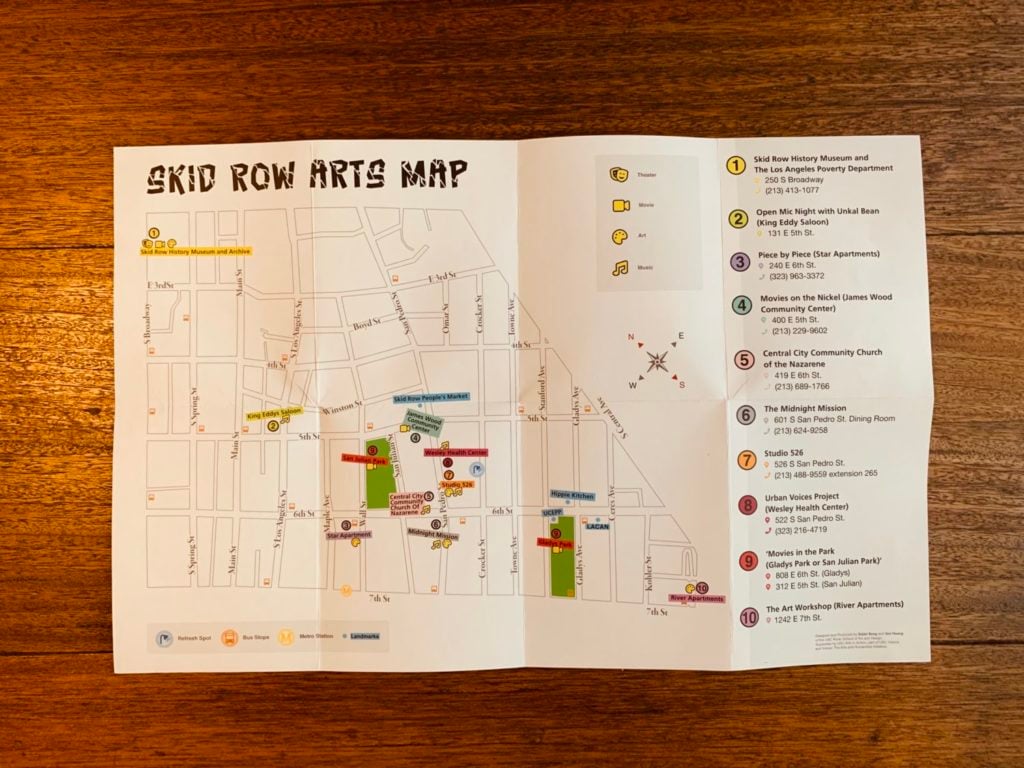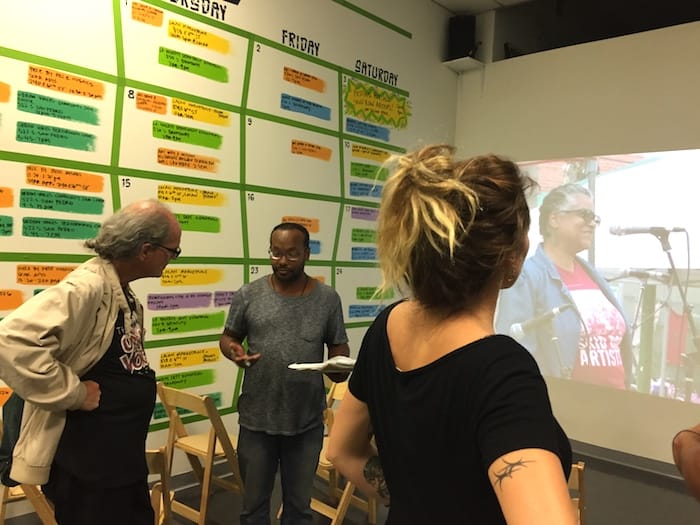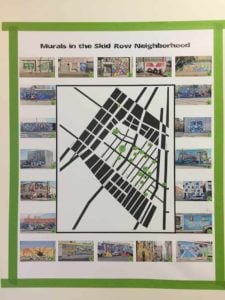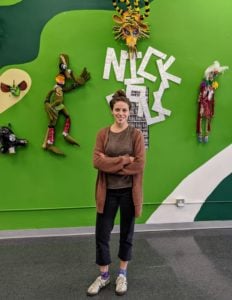Skid Row in downtown Los Angeles, home to one of the largest homeless populations in the United States, stretches across 54 blocks. The no-to-low-income community borders some of the more affluent and gentrified neighborhoods in L.A.
“Historically, people have always been treating Skid Row like it’s not a community,†says Leeav Sofer, co-founder and artistic director of The Urban Voices Project, a Skid Row community choir for marginalized individuals.
The passionate 30-year-old is one of the driving forces behind the Skid Row Arts Map. “With this map we not only say ‘We are here!,’†Sofer tells the Weekly, “We say, ‘We are here and we have culture!’ That changes the perspective.â€
The Skid Row Arts Alliance, a loose aggregation of arts organisations in Skid Row, created the map. The group received support from Arts in Action, a University of Southern California (USC) program. One side of the palm-sized, turquoise, orange and yellow creation features images of the programs listed on the other, catalogued by frequency and type. Cultural landmarks and Refresh Spot locations are also included.

Skid Row Arts Map
“We plant seeds for positive social change by activating intensive arts projects between community partners, students, and faculty,†explains William Warrender, Arts in Action’s Lead Producer since its inception in 2018.
Skid Row’s cultural offerings provide relief from the reality of having to wait months to access services and becoming a case number. “When you walk into a theatre rehearsal or a music workshop you can shine that aspect of your identity within an hour,†says Sofer. “Without these programs there would be such a lack of hope and there is already so much misery.â€
The bearded choir director turned activist has a framed map in his office and high hopes for the roughly 2,000 copies distributed so far. He hopes it will help UVP and other programs recruit a transient population. And it’s supposed to fight NIMBYism (the prevalent not-in-my-backyard attitude) by putting Skid Row on the map, literally, in a positive way.

Skid Row: State of the Arts (courtesy of LA Poverty Dept)
The map idea had been floating around not only in Sofer’s head for several years before it became a reality at the end of 2019. A year earlier, the Los Angeles Poverty Department (LAPD), the oldest area arts program, held the State of the ART: Skid Row exhibit. The show followed up on a similar endeavour ten years ago, taking stock of accessible cultural activities.

Skid Row: State of the Arts (courtesy of LA Poverty Dept)
The group created large scale wall calendars of the months of October and November, leading up to the Skid Row Festival for All Artists, an annual neighborhood celebration. The murals listed all the cultural happenings in the community. The information gathered to create these murals, along with listings in Skid Row Arts Alliance member Studio 526’s newsletter, provided a large chunk of the data for the map’s designers.
USC Roski School of Art and Design MfA students Sebin Song, 25, and Xixi Huang, 29, volunteered to design the map. To get a feel for the community's needs and the available programs, they showed up to monthly busk fests. Busking is what street musicians do when they play for donations, or, in this case, information. They brought large scale map prototypes to these monthly pop up music stations co-created with UVP and student musicians from USC’s Thornton School of Music throughout 2019.
“Together we worked to put it up on a nice easel and invited passersby to color and paint this map with places they think of as arts and culture and creative and that should be mentioned on the map,†Sofer recalls.
Neither South Korean-born Song nor Huang, who hails from China, had any experience with community-driven arts projects before getting involved with Arts in Action. Their participation changed the way the duo looks at their craft.
“Before we got involved, we had feelings about what design should be like. It should be nice and polished and look like everything else you can see online,†says Huang. “Now it’s not just about making something pretty, but how are people going to use it most comfortably,†adds Song.

Clancey Cornell with art by Nick Paul (photo by Jessica Donath)
A few months into the project, Clancey Cornell, who manages LAPD’s archive, became the liaison between the map makers and the arts organizations. “It was a lot of calling all these folks we knew did arts stuff and saying, ‘Hey, when is this parade? When do you do that? What’s the address and contact number?’†she recounts.
“There’s probably a million other things that could go on the map,†says Cornell. She maintains a file on her computer with edits and additions for future iterations. For now, though, the archivist and activist is happy the cultural artifact exists at all.
“We are putting these positive spaces on the map that are providing so much for folks: a sense of community, fun, laughter, a break from reality. To put that on a map is kind of radical.â€
For more information, visit: lapovertydept.org/skid-row-arts-map.